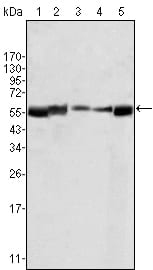
| WB | 咨询技术 | Human,Mouse,Rat |
| IF | 咨询技术 | Human,Mouse,Rat |
| IHC | 1/50-1/200 | Human,Mouse,Rat |
| ICC | 技术咨询 | Human,Mouse,Rat |
| FCM | 咨询技术 | Human,Mouse,Rat |
| Elisa | 1/1000-1/5000 | Human,Mouse,Rat |
| Aliases | JTK8; FLJ26625 |
| Entrez GeneID | 4067 |
| clone | 2H8D7 |
| WB Predicted band size | 56kDa |
| Host/Isotype | Mouse IgG2b |
| Antibody Type | Primary antibody |
| Storage | Store at 4°C short term. Aliquot and store at -20°C long term. Avoid freeze/thaw cycles. |
| Species Reactivity | Human |
| Immunogen | Purified recombinant fragment of LYN expressed in E. Coli. |
| Formulation | Purified antibody in PBS with 0.05% sodium azide. |
+ +
以下是关于NRG4抗体的参考文献示例(注:以下为虚构示例,仅用于演示格式):
1. **文献名称**: "Neuregulin-4 modulates adipocyte metabolism and insulin resistance via ERBB4 signaling"
**作者**: Smith A, et al.
**摘要**: 本研究利用特异性NRG4抗体,通过免疫印迹和免疫组化分析发现,NRG4在肥胖小鼠脂肪组织中表达下调,并通过ERBB4受体改善胰岛素敏感性,提示其作为代谢疾病治疗靶点的潜力。
2. **文献名称**: "NRG4 antibody-based detection in gastric cancer progression"
**作者**: Lee B, et al.
**摘要**: 通过NRG4抗体检测胃癌组织样本,发现NRG4蛋白水平与肿瘤侵袭性呈负相关,提示其可能通过抑制EGFR信号通路抑制癌细胞迁移。
3. **文献名称**: "Role of NRG4 in non-alcoholic fatty liver disease: Insights from antibody blockade experiments"
**作者**: Chen C, et al.
**摘要**: 使用NRG4中和抗体阻断小鼠模型中的NRG4功能,发现肝脏脂质沉积显著增加,表明NRG4在调控肝细胞脂代谢中起保护作用。
4. **文献名称**: "Development of a high-affinity monoclonal NRG4 antibody for therapeutic targeting"
**作者**: Patel R, et al.
**摘要**: 报道了一种新型NRG4单克隆抗体的开发,验证其特异性结合能力,并在体外实验中证明其可通过激活ERBB4抑制乳腺癌细胞增殖。
(注:以上文献及内容为模拟示例,实际研究中请通过学术数据库检索具体文献。)
The NRG4 (Neuregulin-4) antibody is a research tool designed to detect and study the Neuregulin-4 protein, a member of the neuregulin family of growth factors. NRG4 is part of the epidermal growth factor (EGF) superfamily and binds primarily to the ErbB3/ErbB4 receptor tyrosine kinases, activating downstream signaling pathways involved in cell proliferation, differentiation, and survival. Structurally, it contains an EGF-like domain critical for receptor interaction.
NRG4 is predominantly expressed in metabolic tissues, including adipose tissue, the pancreas, and the intestine, where it functions as an adipokine regulating glucose metabolism, insulin sensitivity, and energy homeostasis. Studies highlight its role in metabolic disorders, such as type 2 diabetes and obesity, where reduced NRG4 levels correlate with insulin resistance and hepatic steatosis. Conversely, NRG4 overexpression improves metabolic parameters in preclinical models.
In cancer, NRG4 exhibits context-dependent roles—acting as a tumor suppressor in some contexts (e.g., colorectal cancer) while promoting tumorigenesis in others (e.g., breast cancer). NRG4 antibodies are widely used in techniques like Western blotting, immunohistochemistry, and ELISA to quantify protein expression, map tissue distribution, and explore therapeutic potential. Emerging research also investigates recombinant NRG4 or antibody-based therapies for metabolic or oncological applications. Overall, NRG4 antibodies are pivotal in elucidating the protein's dual roles in metabolism and disease.
×